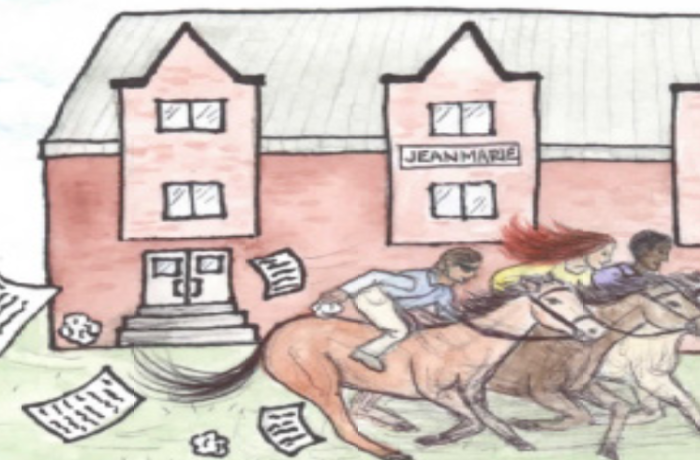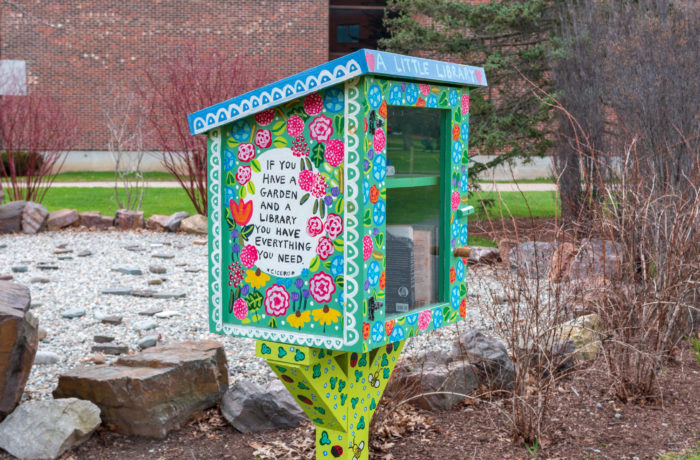
The tense political environment facing the nation over the past year made debate and discussion unavoidable. St. Michael’s prides itself on it’s 11:1 student to faculty ratio, allowing students to actively engage in class discussions. These opportunities for discussion , however, can lead students to question professors’ roles in students’ ideological development.
Ideologies behind a professor’s role in the classroom vary between professors’ approaches, as well as students’ preferences. As students try forming opinions about our country and the world, many feel that professors can be inappropriately open about their own political viewpoints, silencing those who feel differently.
“I think that, because we go to an extremely liberal school students often think that everybody has the same views as them. But in reality, I’ve met a ton of students who have different, more conservative views and feel like they can’t express themselves here in fear of being attacked,” said Aleksandra Apkarian, ‘20.
“For example, I wrote an essay on Clinton’s use of her female anatomy to try and persuade other females to vote for her. When I brought the topic up in class, the students around me immediately thought I was anti-feminist or something along the lines of that. I was questioned for my essay when in reality, I was just pointing out a tactic she was using,” Apkarian recalled from this fall.
“Demographically professors at this school, and at many schools, do lean a little bit more liberal, ” said Luke Kaplan, ’18.
“I know kids who feel like they have been academically stifled by that political bias,” Kaplan continued, “But, who’s to say that there aren’t professors who lean a little conservative and stifle a liberal demographic in the same way?”
“I think that most professors open the classroom to be a safe space. It’s just that students are going to have their opinions. I think teachers try to cultivate openness, but there’s only so much you can do when like 99% of the population feels one way,” said Alijah Legault, ‘20.
Despite debate between students, the political views of professors at St. Michael’s diverse. Shefali Misra, political science professor and Director of the Gender Studies Program agreed. “Students seem to think that all faculty are overwhelmingly left wing, and that’s not necessarily the case, it tends to vary by department,” she said.
Moise St. Louis, Associate Dean of Students, laughed hysterically hearing that some students claim that the faculty at St. Michael’s is stiflingly liberal.
“I’d love to hear where the liberal faculties are. [Students] say that because they don’t like being challenged. They think that what they know from high school, and what their parents tell them is all that there is, and that whoever says something otherwise is just being disrespectful or challenging us. My suggestion to them is read more, get out of their comfort zone, learn more, and then decide [on their beliefs]. Instead of blaming the faculty for triggering them to think,” said St. Louis.
Nat Lewis, English professor and Director of the Environmental Studies Program, noted: “We are a liberal institution and I don’t mean that politically. I mean that we approach the world with compassion, thoughtfulness, understanding, and tolerance. Even the more politically conservative are respectful of cultural differences.”
While professors recognize that their political views can become evident throughout the semester, this should not affect students’ own belief systems.
“Teach us everything but by all means I would love to know what you think. I generally respect all of my professors as individuals and would like to know what they think because they have a big impact on me. Teach me everything but tell me what you believe is right,” Michael Bureau, 18.
“Ethics are certainly a part of [the classroom] but students have to arrive at their ethics through a process of self examination. Not by my telling them what they need to think,” stressed professor Misra.
Misra continued, “If you have a serious question and don’t ask it here, I don’t know where you will. I am actually very pleased when people disagree respectfully with one another because I think that is what is not happening [nationally]. People are not talking to one another, instead they’re digging their heels in.”
Robert Letovsky, business professor, emphasized that professors should only reveal their own opinions in class when the opinion relates to course material. He said, “If I just say it, and say ‘You should think that way because I do,’ that’s ridiculous. [Professors have to] show you in a fact based way and qualify it. The minute people start presenting a non-fact based opinion, alarms bells should be going off.”
“I think my job is to make them see some wisdom in every way. Not that there’s much wisdom in racism, but if I’m talking about racism, rather than telling them it’s wrong I’m interested in informing them about the factual idiocy and the power games that were involved,” said Professor Misra.
Classrooms at St. Michael’s provide students the opportunity to discuss with rather than quietly be lectured by professors. Lewis said, “I genuinely am much more interested in the student who has a different point of view, that’s just fantastic. If students feel they have different views from their professors than they should speak up. Not to hold their ground, but to interrogate their [own] views and the professor’s views.”
As students focus on what professors think, professors wrestle with how they can train their students to think for themselves. Among their diverse teaching styles, professors seem to share one central goal: providing students with the tools to think critically, question the world around them and form their own opinions.
“If we want them to be successful in the world, we have the responsibility to make sure that [students] have the tools to systematically analyze their society, the world, power, privilege, religion, whatever it that they are functioning within,” said St. Louis.
According to Professor Misra, “The goal of an education is, in very basic terms, it is to educate people how to think, but it’s more than that, people have to know facts about the world.”
Professors do not burst students’ ideological bubbles to negate their beliefs, but rather to open them up to other possibilities. Professor St. Louis concluded that students’ frustration lies in that as humans. “We’re quick to dismiss because of what we think, believe and think we know. And we do everybody, including ourselves, a disservice.”


